Viva La Muerte (1970)
Directed by: Fernando Arrabal
Written by: Claudine Lagrive, Fernando Arrabal
Starring: Anouk Ferjac, Ivan Henriques, Mahdi Chaouch, Nuria Espert
For our second Cult Epics review, Doc begins to explore the work of a director you may not have heard of, a crazy genius called Fernando Arrabal.
HCF REWIND N.56. VIVA LA MUERTE [LONG LIVE DEATH] [Spain, 1970]
AVAILABLE ON DVD: From Cult Epics
RUNNING TIME: 90 mins
REVIEWES BY: Dr Lenera, Official HCF Critic
It is the end of the Spanish civil war and those associated with the losing Republicans are being persecuted by the victorious Nationalists. A young boy called Fando has a mother who is religious and sympathetic to the Fascist victors, but his father who is arrested for being on the side of the ‘Reds’. Struggling to deal with the arrest, Fando discovers a letter in which his mother admits to betraying his father. Unconvinced by his mother’s claim that his father died in prison, Fando sets out to find the truth. Aided by his growing curiosity about sex and death, the line between fantasy and reality begins to blur as he tries to deal with what is going on…….
I’m a big fan of the weird and wonderful films of the Chilean director Alexandro Jodorowksy, creator of such surreal masterpieces as El Topo and The Holy Mountain. Therefore I have certainly been aware of Fernando Arrabal for many years. Arrabal was a contemporary and friend of Jodorowsky with a similarly surreal approach to making films. He co-founded the Panic Movement in 1962 with him and Roland Topo, a performance art group dedicated to the surreal and shocking with an attitude similar to Punk. He also wrote the play that Jodorowsky’s Fando And Lis was based on though famously Jodorowsky lost his script he had and had to improvise it from memory. I have never got around to seeing any of Arrabal’s stuff though, so when I got the chance to check out Cult Epic’s two Arrabal box sets I jumped at the chance.
This movie opens in defiantly odd fashion with a children’s song, which has a rather catchy melody, played over bizarre and disturbing pen and ink drawings of sexual torture by the director himself; Arrabal being a man of many talents who also wrote plays, novels, poems etc. Viva La Muerte was actually based on an autobiographical novel of his, Baal Babylone. The music deliberately jars with the images, immediately letting us know that what we are going to see will be something of an assault on the senses. And that is what it quickly becomes. The film mixes beautifully shot 35mm footage with videotaped footage shot with heavily coloured filters and then transferred to film, resulting in a deliberately scratchy appearance. I must admit, this audacious approach threw me of guard at first in the wrong way: I found it a little hard to get into the film. I doubt that Arrabal would have actually been disappointed with my initial reaction to what I was seeing; one of his main interests throughout his life seems to have been to shake things up, to shock us out of our complacency and see the world around us in a different light.
The actual plot of this film is minimal; Fando doesn’t begin his investigation properly until over half way through and it won’t spoil anything if I say he doesn’t get very far, because Viva La Muerte is more about survival, how a child deals with the dreadful environment in which he lives, an environment where him even saying a rude word can result in one of his fingers being thrust into a fire. Every few minutes or so, the videotaped footage is cut in for a minute or so, representing Fando’s mind trying to make sense of what he is seeing or thinking. For example, one notable scene has soldiers gun down a ‘traitor’. In his mind, Fando sees the town children pick up his body and carry it off, either rising the dead person up to being a kind of martyr or just giving him a proper funeral. It’s not clear if these are actual hallucinations or just images coming into Fando’s mind, but Arrabal seems to have thought through very well what a child may think, how a child would interpret things, especially the bit where he imagines the what dreadful fate has befallen his father, from being buried in the sand so folk on horseback can play polo with his head, to being sown into a cow’s carcass.
On this first viewing, I was reminded me of the late great Ken Russell at his inventive and audacious best, perhaps crossed with that great poetic childhood film from Spain The Spirit Of The Beehive. Russell, however, rarely went as far as Arrabal does throughout this film in the extremity of his imagery. Eyes are gouged out with fingernails. Ears are burnt out. The mother defecates on the father’s head. In a somewhat troubling aspect, Fando has incestuous desires for his mother, and we see his eroticised feelings pictorialised. Whilst much of Viva La Muerte makes some kind of sense in that it’s about a child coping with his feelings and his horrid life, and also contains much political comment about the nature of Fascist regimes and the corruptness of the Catholic Church [two things very pertinent to Spain], I don’t quite know how the incestuous aspect fits in, except maybe to help make Fando not as sympathetic as you may expect. After all, he even appears to treat his only friend Theresa in a violent fashion, perhaps showing how cruelty can be passed down and that we may very well have the makings of a brutal killer here; hardly surprising considering what he is going through.
There is a bit of real-life medical gore towards the end, but the aspect about Viva La Muerte I personally had trouble with is its animal cruelty. Filmmakers as different as Jodorowsky and Ruggero Deodato [Cannibal Holocaust] used animal slaughter to make points, but I’ve always found it hard to excuse to be honest. In Viva La Muerte, Fando casually cuts a beetle in half, a woman bites off a lizard’s head as she sexually climaxes, and in a really horrible scene, a cow is gutted while it’s still alive. This final scene really made me feel sick and I don’t really think there’s any excuse for it. On the evidence of this film, Arrabal is a highly original, interesting filmmaker with things to say, so why did he have to resort to torturing a poor cow? I am sure that he could have found another way to get whatever he was trying to say across.
The performances in this film are not the best, but add to the strange realism. Viva La Muerte did not seem to me to be as close to Jodorowksy as I expected; for example, it has a complete absence of the mysticism and philosophical elements you find in the Chilean director’s work. Though I certainly had problems with the odd aspect, I found it to be an absolutely fascinating watch, with images full of meaning which I may not grasp until a second or third viewing, or maybe I never will….but will affect me in a very direct way [in this aspect, very much like Jodorowsky!] I shall view Arrabal’s other films with great interest. I doubt that I will like all of what I will see, but it will be a rewarding trip, and will also constantly ram home how bland and complacent much filmmaking is, especially, it seems, today.
The DVD release of Viva La Muerte from Cult Epics includes:
*New digital transfer
*Interview with Fernando Arrabal [[who, I may add, comes across as being wonderfully bonkers!]
*Theatrical trailer
It is also available as part of 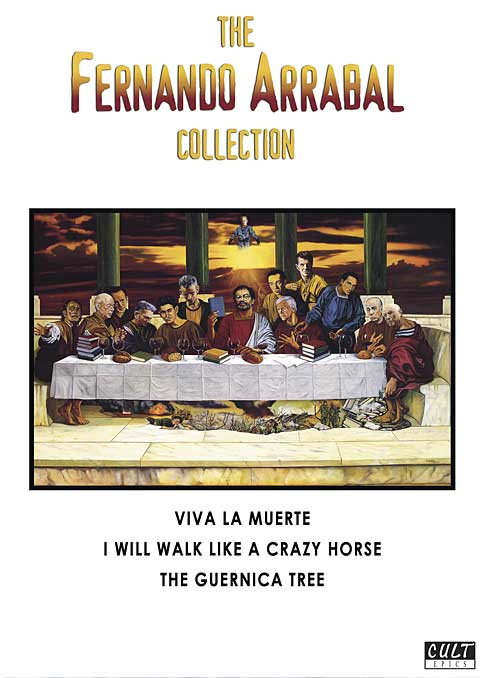
Check out Cult Epics’s site at
Review of the next film in the set I Will Walk Like A Crazy Horse coming soon…..

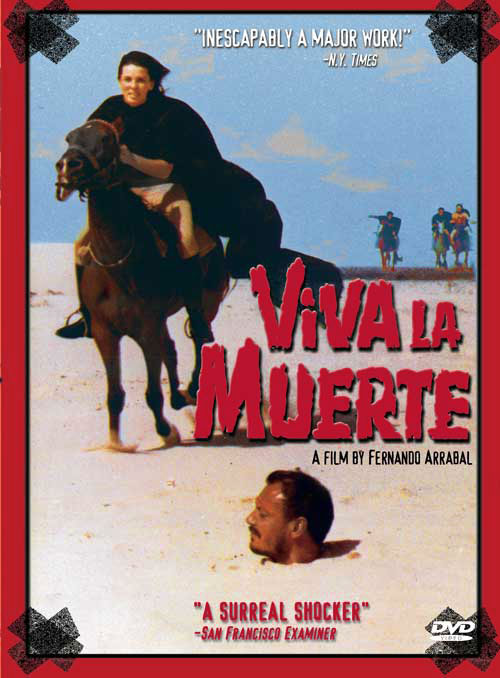
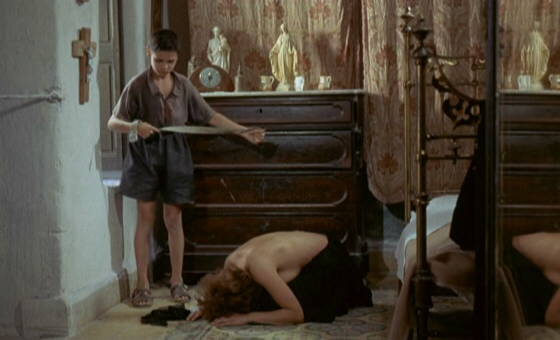
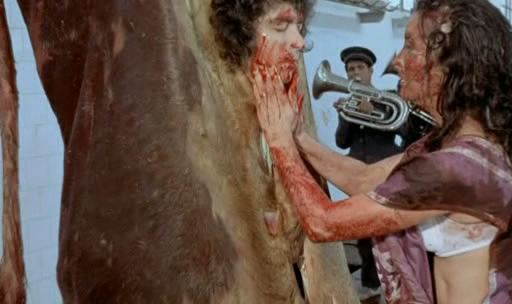




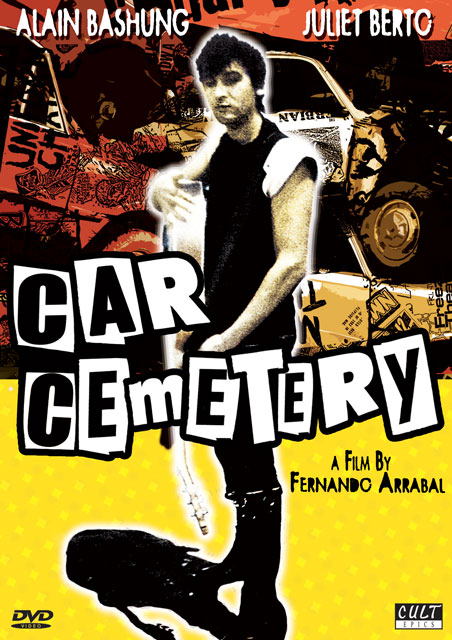
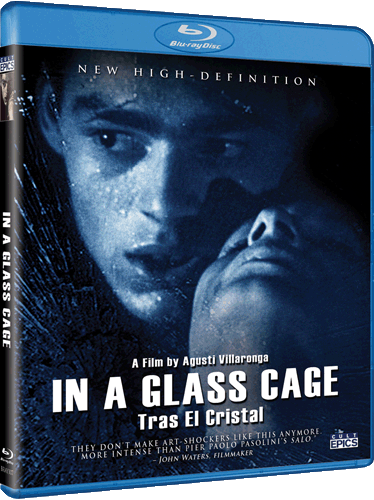
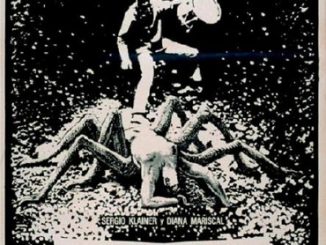
Be the first to comment